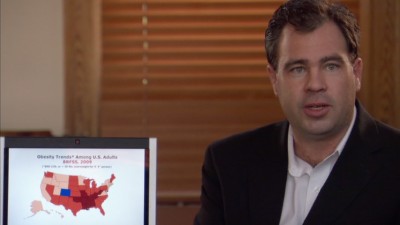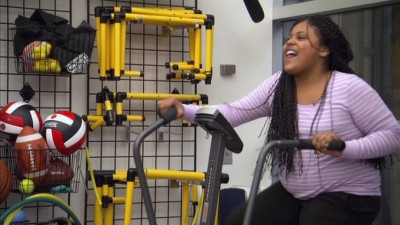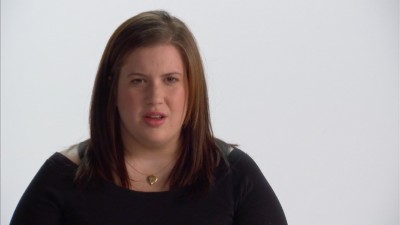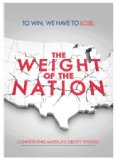| Reviews & Columns |
|
Reviews DVD TV on DVD Blu-ray 4K UHD International DVDs In Theaters Reviews by Studio Video Games Features Collector Series DVDs Easter Egg Database Interviews DVD Talk Radio Feature Articles Columns Anime Talk DVD Savant Horror DVDs The M.O.D. Squad Art House HD Talk Silent DVD
|
DVD Talk Forum |
|
|
| Resources |
|
DVD Price Search Customer Service #'s RCE Info Links |
|
Columns
|
|
|
Weight of the Nation, The

It seems very unlikely to me that most people haven't yet heard about this, but just in case: There's an obesity epidemic in the United States, it's taking a huge toll on our individual health and our economic well-being as a society, and it's come upon us quite suddenly, with an extremely sharp increase in U.S. obesity rates over the last 30 years. The coverage of this scourge is all around us, in both serious and frivolous forms (you can read all about it in numerous commissioned, official reports, or just surf channels and scan the supermarket newsstand), so yet another reiteration might seem redundant or even self-indulgent. But HBO Documentary Films' presentation The Weight of the Nation, a four-part series shown on the reliably high-standard premium cable channel earlier this year, aims to cut through all the seemingly ceaseless obfuscation and mounting hysteria to give us a rational, thoughtful, honest, calm and well-considered look at the problem from all of its myriad angles. It's a noble goal, but the result is, unfortunately, quite a mixed one.

The series is divided into four parts of about an hour's running time each: "Consequences," "Choices," "Children in Crisis," and "Challenges." The first episode is the best and most promising, starting things off in a very factual and forthright manner as various medical experts, along with a complementary roster of patients/individuals/study participants, list off and explain the health consequences of being overweight or obese -- diabetes, high blood pressure, cardiovascular problems, arthritis, cancer, etc. Coverage of a very long-running study focusing on the lifetime heart health of hundreds of residents of a small Louisiana town strikes the best balance (or, better put, best shows the connections) between the scientific and the personal that the series has to offer, with testimonials and footage from lifetime participants and explications from the study's founders and coordinators all demonstrating the beginnings of heart disease, usually considered an aging problem, in the earliest parts of childhood, particularly when the children in question have eating habits and lifestyles that foster inactivity, high-fat/sugar intake, and obesity. This episode also contains the single most vivid image of the entire series: Two autopsied hearts, one from a relatively fit 26-year-old and one from an older, obese stroke victim (the former normal-looking, red as expected; the latter gruesomely swollen and congested with yellow plaque) are compared and contrasted by cardiovascular physicians to actually show, in all its gory explicitness, the very visible difference our diet and activity level make to all that important stuff inside us that we can't see and too often don't think about until there's something wrong.

More often than not, though, the series' director/writer, Dan Chaykin, and his team of documentarians (all of whom, it should still be noted, have put in an extraordinary amount of leg work, traveling all over the country to cover the multiple obesity-related stories brought together under The Weight of the Nation's umbrella), don't quite reach that balance between the hard science and facts around obesity and a much more typical-for-TV, quasi-exploitative overreliance on individual testimonials; it becomes difficult to discern what, if any, organization of their material or structure they're really hewing to as the intermixed parade of interviews, stories, and day-in-the-life footage becomes progressively more anonymous and even blurrily arbitrary, less rigorously systematic than seemingly free-associative (perfectly fine and very effective if you're David Lynch, but counter to the self-evidently instructional/informative purposes of something like The Weight of the Nation). I have no doubt that best of intentions lay behind the recurrent segment in which obese individuals were brought before a stark-white background for talking-head interviews in which they relate their individual experiences with eating, exercise, and struggles with their weight at the physical and emotional levels, but it's exhausting and not very helpful, either to us or to the obesity sufferers on camera. It's certainly important to show the impact of the topic on individual, day-to-day lives, but in this supposedly informational context, a little of this goes a long way, and it's decidedly "soft news," ultimately just (problematically) entertaining stories of people's misery that are given much too much screen time relative to the "hard news" of the doctors, public-health officials, and academics who actually have the objective, verifiable insights and ideas that we and those obese interviewees are really looking for and in need of. The solution-illustrating segments, in which a team of coworkers all join together to support their obese manager's attempt to change her habits, or a couple of friends who hold each other to an exercise commitment, do offer some (familiar) ideas on what to do about it, but they represent only the flip-side of the same problem with keeping things so testimonial-based. They're more inspirational than informational, and televised-documentary inspirations for pragmatically healthy practices are fairly common, readily available on Oprah, and not due the extensive time they're granted here, which would have been more productively and interestingly spent on the, yes, drier but less widespread and more objective facts of the matter.

The series also stops short of some of the more obvious (if "controversial," in our government-is-bad, Tea Partying times) solutions to the national problem of obesity, which -- according to several interviewed experts who have been exclusively studying for very long periods the relationship of income disparity to obesity (poorer = much higher risk for obesity, diabetes, etc.) and of public infrastructure to physical activity (safe, well-maintained, readily accessible parks and sidewalks are crucial), and also according to critics of corporate-profit interest in food habits directly linked to obesity -- would have to do not just with struggling to alter our ingrained, obesity-inducing habits, but equally with governmental policy changes and much closer regulation of the highest-profit, least healthy foods at the corporate and agricultural levels, as well as a long, hard, close, uncomfortable look at the American crisis of extreme wealth gaps that has been coming to light, clearly not coincidentally, right around the same time that we're noticing our kids, most particularly and undeniably our poorer kids (whose numbers are increasing rapidly), are getting fat. One New York public-health official is allowed to say, on camera, "Government is how we solve problems collectively that we can't solve individually," and the profit motives, marketing, and lobbying that (it should be painfully obvious to anyone with eyes) self-interestedly create and feed into an unhealthy nutritional environment do come in for a fair amount of direct criticism. But the series remains vague on just what those "collective" solutions would be and how they might be implemented, once again trying and not quite succeeding in striking a balance, this time between the public and the personal responsibilities when it comes to fighting obesity. It is, in short, much too specific on the more entertaining, human-interest stuff, where it malingers unduly, and far from specific enough when it comes to the tough, possibly quite unpopular decisions, personal and political, that need to be made, and the sooner the better.

The final blow that renders The Weight of the Nation more mumbly and well-meaning than efficacious or hard-hitting is its style. You've seen it before in all kinds of entertainment, and quite routinely in "reality" based programming on television; it's a sort of quasi-documentary but near-wholly artificialized presentation of sped-up/fast-cut images; thumping synthesized score that replicates the "chic," numbed sonic experience of passing by shopping-mall storefronts (here, courtesy of composers Wendy Blackstone, Adam Dorn, and Daniel Frieberg) as spoonfuls of sugar to make the medicine of informative content go down easier; and anodyne, postcard-like scenes of atypically motivated, suspiciously cheerful people cooking up healthy meals or out walking in the cold. (As a weight-struggler myself, I'm waiting for the more relevant and honest, more genuinely inspiring, vérité-style, direct-cinema anti-obesity doc that follows a fat but scared-for-their-health individual, with no commentary and no easy, constant cut-ins or cutting away, as he or she huffs and puffs and sweats and groans his or her way into physical fitness; complains bitterly about how less-appealing, healthier produce and whole, unsugared grains cost more than all the cheap, tempting empty-calorie deliciousness; and becomes an absolute monster to live with as they suffer the pizza and ice-cream withdrawals.) It's not that there aren't real nuggets of very good information here, and with further, better-considered detail than you normally get when the subject comes up in any kind of media; it's just that they've been sterilized, diluted with too many pleasantries and too-obvious aesthetic attempts to avoid the serious, possibly grim tone demanded by a deadly and pervasive disease. It's worth noting that The Weight of the Nation was produced in conjunction with The Centers for Disease Control, National Institutes of Health, Kaiser Permanente Foundation, et al., and it is perhaps as a consequence of those origins that the bulk of it has that false, institutional, not at all urgent sheen one associates with forgettable public service announcements. It's too pleasant, too forgettable for its own (and our) good, ultimately engaging one's temporary interest but failing to make the impact it claims to be aiming for by, for example, confronting us with too much of anything that might actually broaden our frame of reference, change our perspective, or challenge us with a problem whose gravity even the overall lightweight feel of The Weight of the Nation can't quite make us forget.

THE DVD:
The transfer presents the program anamorphic-widescreen at its original televised aspect ratio of 1.78:1. Everything looks great; save for archival footage (which has signs of wear and tear, as aesthetically appropriate), high-definition digital video was used for shooting, and as usual, it makes the transition to DVD without a hitch: no aliasing, edge enhancement, or other compression artifacts are to be seen at any point, and all colors are vivid, blacks solid, and skin tones natural-looking. A very nice visual presentation.
Sound:The Dolby Digital 2.0 soundtrack is clear, full, and vibrant, with every layer of sound (which here consists mostly of interview dialogue and the music score) given its full span and without any distortion or imbalance whatsoever.
Extras:--An entire third bonus disc contains 12 short films as addenda to the main programs. Varying in length (the shortest about eight minutes, the longest about 30), some of these shorts are simply expansions upon segments that appeared in the series proper, while some introduce topics barely mentioned, or not at all: all the implications of obesity in conjunction with pregnancy, for example, or the social aspects/stigmatization of obesity most readily apparent to all of us despite its cursory or not very well-explained in the actual episodes. In all, there is more detail of information and in-depth patience in these bonus films here than in the four parts of the series, though the quick-edit/wall-to-wall techno music approach remains.
--A 20-page booklet that offers summaries of and principal statistics from each episode, as well as rundowns of the bonus short films and pointers to additional online resources.

Obesity and the United States' epidemic proportions of it are topics that we're obsessed with at the same time that they seem to overtake us and leave us bewildered, and with so much constant chattering, misinformation, and a generally overwhelming quantity of cascading information and ideas surrounding it, the four-part HBO Documentary series The Weight of the Nation's attempt to cut through the hype to acknowledge the facts of the matter in all their complexity is admirable. It's not quite successful, though; for all its criticisms of slick, alluring fast-food advertising and the misleading exploitation of network shows like The Biggest Loser, these four hours of TV are much longer on style than substance, and they succumb too often to a human-interest-story trivialization rather similar to that of those horrible TV-news segments, also somewhat hypocritically criticized here, that cheaply sensationalize the matter, catching our attention by cutting off fat people at the neck to draw our instant dismay and judgment. Underneath the tricks, however, there is significantly more useful, interesting, and real information to be found in The Weight of the Nation that make it partially worthwhile, particularly for anyone who has somehow not yet considered our country's obesity epidemic, its troublingly difficult-to-untangle causes, and its potential solutions. If, however, you do have even a basic understanding of the disease's various factors, causes, and the difficult problems it poses at multiple levels of our political and social systems, you probably don't need The Weight of the Nation and its long-winded, insufficiently disciplined approach to explaining them. When it comes down to it, the most essential and substantive information on hand here could probably have been more succinctly stated in not much more than a single hour, and as any of the multiple on-camera obesity experts would be sure to tell you, that would have left us three precious hours of not sitting and looking at something on a screen -- time that might be better used to go for a bike ride or take a walk. Rent It.
|
| Popular Reviews |
| Sponsored Links |
|
|
| Sponsored Links |
|
|
| Release List | Reviews | Shop | Newsletter | Forum | DVD Giveaways | Blu-Ray | Advertise |
|
Copyright 2024 DVDTalk.com All Rights Reserved. Legal Info, Privacy Policy, Terms of Use,
Manage Preferences,
Your Privacy Choices | |||||||














